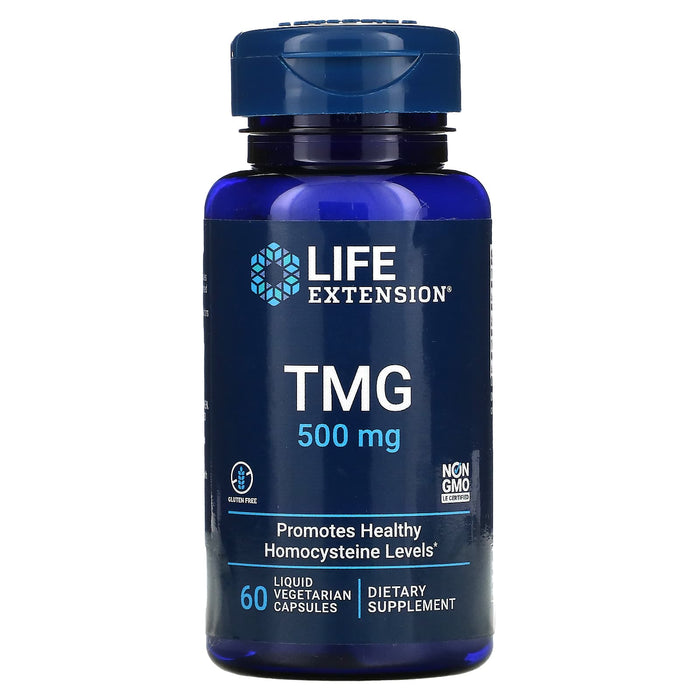




| Serving Size: 2 Liquid Vegetarian Capsules | ||
| Servings Per Container: 30 | ||
| Amount Per Serving | % Daily Value | |
| Trimethylglycine (TMG) (as betaine anhydrous) |
1000 mg |
** |
| **Daily Value not established. | ||
Support liver and cardiovascular health with TMG by Life Extension, a trimethylglycine supplement.
TMG (Trimethylglycine) is a dietary supplement that supports healthy homocysteine levels, cardiovascular function, and overall well-being. This non-GMO, gluten-free formula provides a potent dose of TMG, which has been linked to beneficial effects on liver function, mitochondrial health, and inflammatory response.
Read the entire label and follow the directions carefully prior to use.
Take two (2) capsules in the morning or as recommended by a healthcare practitioner. TMG should be taken with co-factors B6, B12, and folic acid.
Glycerin, vegetable cellulose (capsule), purified water.
At Health Orchard, we are committed to providing accurate product information and images. However, manufacturers may update their product packaging or ingredients, and these changes may not be immediately reflected on our website. It's possible for products to be shipped with different packaging than what is shown online. For the most accurate and safe use of any product, we advise reading the product's label, warnings, and instructions rather than relying solely on the details provided by Health Orchard.
TMG (trimethylglycine) supplements are primarily used to support cardiovascular health and liver function. They may help lower homocysteine levels, which is associated with reduced risk of heart disease, and can potentially improve exercise performance and muscle strength by supporting the body's natural production of creatine.
The optimal time to take TMG can vary depending on individual needs and goals. Some people prefer taking it in the morning to support energy levels throughout the day, while others may take it before exercise to potentially enhance performance. Splitting the dose throughout the day or taking it with meals can also be beneficial for consistent absorption.
TMG is not FDA approved as a medication, as it is classified as a dietary supplement. The FDA does not approve dietary supplements in the same way it does prescription drugs. However, TMG is generally recognized as safe (GRAS) by the FDA when used as a food additive, and it is widely available as a supplement in the United States.
While TMG is generally well-tolerated, some potential side effects may include digestive discomfort, nausea, or diarrhea, especially when taken in high doses. In rare cases, some individuals may experience headaches, dizziness, or skin reactions. It's important to start with a lower dose and gradually increase as tolerated to minimize the risk of side effects.
TMG has been associated with potential anti-aging benefits due to its role in supporting cellular health and DNA methylation processes. It may help protect against oxidative stress and support overall cellular function, which could contribute to healthy aging. However, more research is needed to fully understand its anti-aging effects in humans.
While TMG is generally considered safe for most people, it can potentially cause side effects in some individuals. These may include digestive issues like nausea or diarrhea, especially when taken in high doses. Some people may also experience headaches, dizziness, or skin reactions, although these are less common.